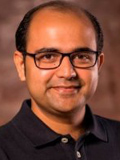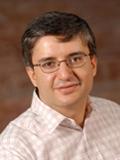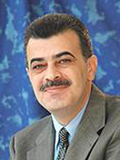Tutorials
Program
Monday Morning, 18 May 2015, 09:00 - 12:30
T1: Green Heterogeneous Networks
Muhammad Zeeshan Shakir, Texas A&M University at Qatar
Mohamed-Slim Alouini, King Abdallah university of Science and Technology, Saudi Arabia
Khalid A. Qaraqe, Texas A&M University at Qatar
Click here for details >>
Monday Afternoon, 18 May 2015, 14:00 to 17:30
T2: Network Infrastructure for the Internet of Things and M2M Communications
Biplab Sikdar, National University of Singapore
Click here for details >>
Details
T1: Green Heterogeneous Networks
by
Muhammad Zeeshan Shakir, Texas A&M University at Qatar
Mohamed-Slim Alouini, King Abdallah university of Science and Technology, Saudi Arabia
Khalid A. Qaraqe, Texas A&M University at Qatar
Abstract: Heterogeneous small-cell networks (HetNets) are considered as a remarkable solution to the challenging demands such as high spectral and energy efficiency of future mobile communication networks. HetNets are typically composed of multiple radio access technologies where multiple low-power, low-cost user/operator deployed small cell base stations are complementing the existing network. In this tutorial, we will investigate and study the spectral efficient and energy-aware deployment of small-cells in 5G HetNet. We will present and compare deployments of several small cell technologies around the edge of the macrocell such that the small-cell base stations serve the cell-edge mobile users, thereby expanding the network coverage, increasing the capacity and improving the energy consumption of HetNets. Simulation and theoretical results will be presented and discussed to demonstrate the spectral and energy improvements in comparison to existing and other traditional small-cell deployment configurations in HetNets. Specifically, this tutorial will provide answers for the following:
- What are the Green competitive technologies to expand the cellular coverage?
- What are the ecological and associated economic impacts of energy savings in HetNets?
- What are the contributing factors to the downlink and uplink energy consumption of the HetNets (end-to-end power consumption breakdown including backhaul)?
- What are the recent capacity enhancement techniques for advanced HetNets?
 Muhammad Zeeshan Shakir is an Assistant Research Scientist with the Wireless Research Lab, Texas A&M University at Qatar (TAMUQ), Doha, Qatar, since July 2012. Previously, from November 2009 to June 2012, he was a Research Fellow with the Communication Theory Lab, King Abdullah University of Science and Technology (KAUST), Thuwal, Saudi Arabia. He received PhD degree in Electronic and Electrical Engineering from University of Strathclyde, Glasgow, UK in 2010. His research interests include design and deployment of diverse wireless communication systems including hyper-dense heterogeneous small-cell networks with particular focus on traffic offloading/backhauling techniques and Green communications. He has published more than 75 technical journal and conference papers and has contributed to 6 books, all in well reputed venues. His most of the research has been sponsored by Qatar National Research Fund (QNRF) and national industrial partners.
Muhammad Zeeshan Shakir is an Assistant Research Scientist with the Wireless Research Lab, Texas A&M University at Qatar (TAMUQ), Doha, Qatar, since July 2012. Previously, from November 2009 to June 2012, he was a Research Fellow with the Communication Theory Lab, King Abdullah University of Science and Technology (KAUST), Thuwal, Saudi Arabia. He received PhD degree in Electronic and Electrical Engineering from University of Strathclyde, Glasgow, UK in 2010. His research interests include design and deployment of diverse wireless communication systems including hyper-dense heterogeneous small-cell networks with particular focus on traffic offloading/backhauling techniques and Green communications. He has published more than 75 technical journal and conference papers and has contributed to 6 books, all in well reputed venues. His most of the research has been sponsored by Qatar National Research Fund (QNRF) and national industrial partners.
Dr. Shakir has been/is giving tutorials on emerging wireless systems at IEEE flagship conferences including IEEE ICC 2014, Sydney and IEEI Globecom 2014, Austin. He has been a member of TPC of several IEEE flagship conferences. He is the founder of IEEE Workshop BackNets 2015. He is the technical Chair of Crowncom 2015 and several special sessions/workshops. He is serving as a Lead Guest Editor for special issues in IEEE Comm Mag and IEEE Wireless Comm Mag. Currently, he has been serving as Secretary to the IEEE DySPAN 1900.7. He is an active member of IEEE and IEEE Standard Association.
 Mohamed-Slim Alouini was born in Tunis, Tunisia. He received the Ph.D. degree in Electrical Engineering from the California Institute of Technology (Caltech), Pasadena, CA, USA, in 1998. He served as a faculty member in the University of Minnesota, Minneapolis, MN, USA, then in the Texas A\&M University at Qatar, Education City, Doha, Qatar before joining King Abdullah University of Science and Technology (KAUST), Thuwal, Makkah Province, Saudi Arabia as a Professor of Electrical Engineering in 2009. His current research interests include the modeling, design, and performance analysis of wireless communication systems.
Mohamed-Slim Alouini was born in Tunis, Tunisia. He received the Ph.D. degree in Electrical Engineering from the California Institute of Technology (Caltech), Pasadena, CA, USA, in 1998. He served as a faculty member in the University of Minnesota, Minneapolis, MN, USA, then in the Texas A\&M University at Qatar, Education City, Doha, Qatar before joining King Abdullah University of Science and Technology (KAUST), Thuwal, Makkah Province, Saudi Arabia as a Professor of Electrical Engineering in 2009. His current research interests include the modeling, design, and performance analysis of wireless communication systems.
 Khalid A. Qaraqe was born in Bethlehem. Dr Qaraqe received the B.S. degree in EE from the University of Technology, in 1986, with honors. He received the M.S. degree in EE from the University of Jordan, Jordan, in 1989, and he earned his Ph.D. degree in EE from Texas A&M University, College Station, TX, in 1997. From 1989 to 2004 Dr Qaraqe has held a variety positions in many companies and he has over 12 years of experience in the telecommunication industry. Dr Qaraqe has worked for Qualcomm, Enad Design Systems, Cadence Design Systems/Tality Corporation, STC, SBC and Ericsson. He has worked on numerous GSM, CDMA, WCDMA projects and has experience in product development, design, deployments, testing and integration. Dr Qaraqe joined the department of Electrical and Computer Engineering of Texas A&M University at Qatar, in July 2004, where he is now a professor. Dr. Qaraqe research interests include communication theory and its application to design and performance, analysis of cellular systems and indoor communication systems. Particular interests are in mobile networks, broadband wireless access, cooperative networks, cognitive radio, diversity techniques and beyond 4G systems.
Khalid A. Qaraqe was born in Bethlehem. Dr Qaraqe received the B.S. degree in EE from the University of Technology, in 1986, with honors. He received the M.S. degree in EE from the University of Jordan, Jordan, in 1989, and he earned his Ph.D. degree in EE from Texas A&M University, College Station, TX, in 1997. From 1989 to 2004 Dr Qaraqe has held a variety positions in many companies and he has over 12 years of experience in the telecommunication industry. Dr Qaraqe has worked for Qualcomm, Enad Design Systems, Cadence Design Systems/Tality Corporation, STC, SBC and Ericsson. He has worked on numerous GSM, CDMA, WCDMA projects and has experience in product development, design, deployments, testing and integration. Dr Qaraqe joined the department of Electrical and Computer Engineering of Texas A&M University at Qatar, in July 2004, where he is now a professor. Dr. Qaraqe research interests include communication theory and its application to design and performance, analysis of cellular systems and indoor communication systems. Particular interests are in mobile networks, broadband wireless access, cooperative networks, cognitive radio, diversity techniques and beyond 4G systems.
Network Infrastructure for the Internet of Things and M2M Communications
by
Biplab Sikdar, National University of Singapore
Abstract: The living, work, and industrial environment of the future will comprise of environments formed by extremely large numbers of devices that are producers and consumers of information, and whose interaction will be facilitated by the Internet of Things (IoT). While such networks and systems will play a critical role in facilitating the automation and improving the efficiency of a number of applications, and enhancing the efficiency of overall quality of life, there are a number of technical challenges in the way of their implementation. The most fundamental of these challenges is that of scale, resulting from the explosion in the number of devices in such networks (expected to be in the trillions according to current estimates). This tutorial will provide an introduction and in depth coverage of the challenges associated with facilitating such large scale communications. The tutorial will start with an introduction to the characteristics of IoT and machine to machine (M2M) communication systems and the outstanding key challenges to be overcome. Next, the tutorial will focus on the network access technologies for IoT and M2M communications, including both the capillary (IEEE 802.15.4e and low power WiFi) and cellular (ETSI M2M and 3GPP LTE-M) components. For each access mechanism, the performance and scalability aspects will be discussed in detail. Finally, ongoing standardization efforts towards the development of protocols for M2M communications will be discussed.
 Biplab Sikdar received the B. Tech degree in electronics and communication engineering from North Eastern Hill University, Shillong, India, M. Tech degree in electrical engineering from Indian Institute of Technology, Kanpur and Ph.D in electrical engineering from Rensselaer Polytechnic Institute, Troy, NY, USA in 1996, 1998 and 2001, respectively. He joined the Department of Electrical, Computer and Systems Engineering of Rensselaer Polytechnic Institute in 2001 as an Assistant Professor. He is currently an Associate Professor in the Department of Electrical and Computer Engineering of National University of Singapore. His research interests include wireless MAC protocols, transport protocols, network security and queuing theory. He currently serves as an Associate Editor for the IEEE Transactions on Mobile Computing and has previously served on the editorial board of the IEEE Transactions on Communications. Biplab is a member of Eta Kappa Nu, Tau Beta Pi and a senior member of IEEE.
Biplab Sikdar received the B. Tech degree in electronics and communication engineering from North Eastern Hill University, Shillong, India, M. Tech degree in electrical engineering from Indian Institute of Technology, Kanpur and Ph.D in electrical engineering from Rensselaer Polytechnic Institute, Troy, NY, USA in 1996, 1998 and 2001, respectively. He joined the Department of Electrical, Computer and Systems Engineering of Rensselaer Polytechnic Institute in 2001 as an Assistant Professor. He is currently an Associate Professor in the Department of Electrical and Computer Engineering of National University of Singapore. His research interests include wireless MAC protocols, transport protocols, network security and queuing theory. He currently serves as an Associate Editor for the IEEE Transactions on Mobile Computing and has previously served on the editorial board of the IEEE Transactions on Communications. Biplab is a member of Eta Kappa Nu, Tau Beta Pi and a senior member of IEEE.



